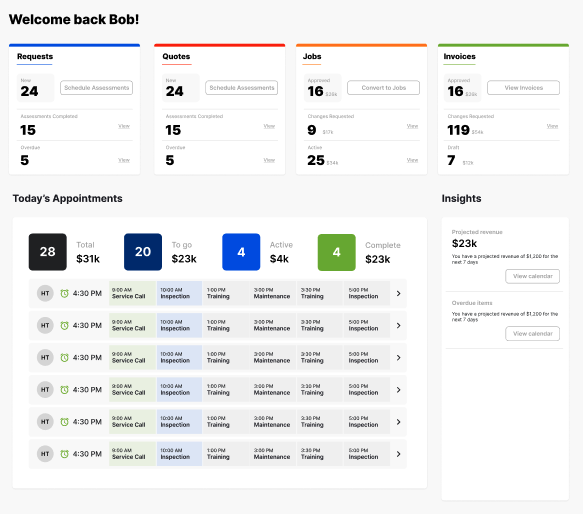The Essential Role of Streamlined Scheduling and Dispatching Software
The goal of effective field service management software is to assist service businesses in various operations, notably scheduling and dispatching. By incorporating efficient and effective scheduling and dispatching features, businesses can expand their operations and collect satisfied clients.
Duration:
Published on February 28, 2024
Without proactive customer outreach, it's improbable for your business to thrive in the long run. The initial adopters of field service encompass service providers like HVAC installation teams, locksmiths, landscapers, cleaning service providers, pest control, fire and safety providers, appliance repairers, CCTV, pet sitting, security service providers, and more. However, in today's landscape, most businesses require field service for delivery, installation, repairs, and maintenance.
Field service management software plays a crucial role in streamlining and optimizing field service operations. This software provides tools for scheduling, dispatching, tracking, quoting and invoicing and reporting field service activities.
The Importance of Streamlined Scheduling and Dispatching
Streamlined scheduling and dispatching are essential for the effectiveness of field service operations. They guarantee that skilled technicians promptly arrive at the customer's location and provide top-notch, timely services. By routing these assignments through software, resource utilization is optimized, leading to enhanced internal efficiency.
Satisfied customers are more likely to become loyal clients and vocal supporters of the brand. Decreasing wastage and boosting internal efficiencies also heighten business competitiveness.
The Problem of Manual Scheduling
Today's customers expect services to be delivered on-demand, with 24/7 service becoming the norm across many industries. Unexpected events can occur at any moment: field agents may call in sick, customers might request changes to their appointment times, emergency jobs could necessitate rescheduling, and inclement weather might force adjustments. Furthermore, upon arrival at the work site, field agents may encounter discrepancies between the assigned job and the actual task, leading to further delays or the need for rescheduling.
These trends significantly elevate the complexity of scheduling field jobs, requiring intensive coordination to ensure competent field technicians are available at the right times.
Without an optimal dispatch and scheduling process, inefficiencies abound. Work crews and technicians may remain idle at one location while customers wait elsewhere, leading to unnecessary backtracking and increased labor costs, fuel expenses, and overheads. Prolonged wait times for customers result in dissatisfaction and negative reviews, further underscoring the importance of efficient scheduling and dispatching systems.
Benefits of Utilizing Software for Scheduling and Dispatching Tasks
Field service software offers a wide array of advantages, streamlining operations and minimizing wastage. Upon receiving a work order or client request, the scheduler swiftly identifies the location of field agents and assigns tasks to the nearest available agent. Alternatively, grouping jobs by location at the outset of the day minimizes travel time. This efficient dispatching process significantly reduces customer wait times, thereby enhancing overall satisfaction.
Furthermore, it equips service providers with the resilience to swiftly address emergency requests. Employee productivity, vehicle utilization rates, and equipment usage efficiency all see notable improvements, while operational expenses such as fuel costs are reduced.
Integrating inventory management into the software enables schedulers to cross-check the availability of parts before dispatch, leading to enhanced first-time fix rates. Avoiding situations where field agents must return due to lack of tools or spare parts is crucial in minimizing wastage and preventing double overheads for the service provider.
By integrating with mapping tools, field service software ensures efficient dispatching by guiding crews through the most optimal routes to their work sites. This reduces delays and conserves energy and fuel that would otherwise be wasted navigating unfamiliar areas or seeking directions.
Moreover, many home service software solutions incorporate communication tools, facilitating seamless interaction between agents, customers, and the office. These dedicated communication channels maintain comprehensive logs and facilitate easy traceability of conversations. Additionally, knowledge repositories provide field agents with comprehensive information about assigned tasks, empowering them to perform their duties more efficiently and effectively by understanding the context and history of each job.
